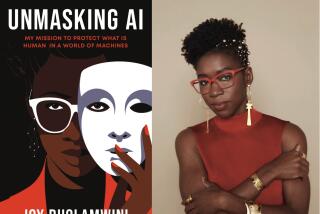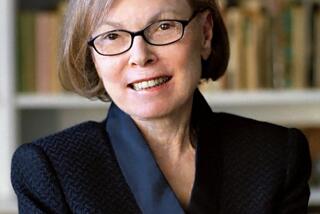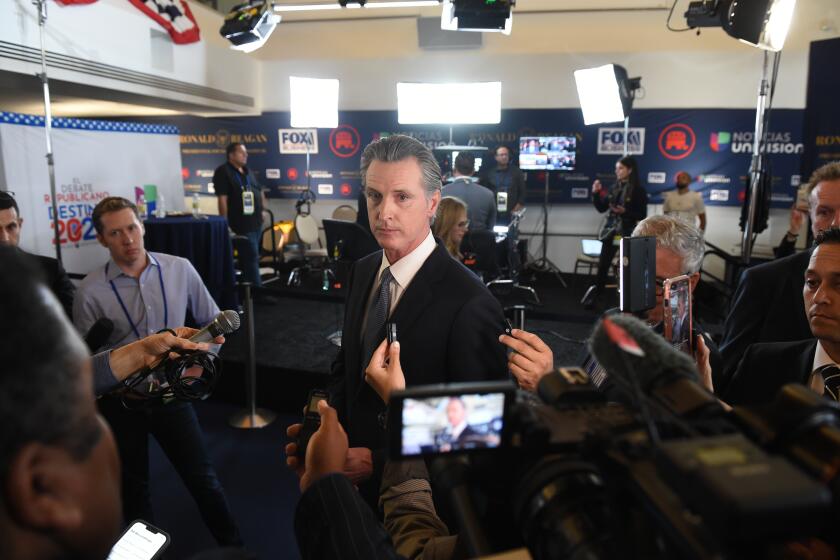So Many Writers, So Little Time
As she waited Sunday for a panel on fiction writing to commence, Sherry Banks wore a T-shirt reflecting the sentiments of many people attending the third annual Los Angeles Times Festival of Books at UCLA:
“So many books--so little time,” read the shirt, and Banks added her own variation as the event drew to a close. “So many panels, and so little time,” she said. “There’s so much richness here, such great writers, and you could never see all of them in two days.”
More than 100,000 people jammed into this year’s festival, the largest crowd in the history of the conclave. And it would have been impossible for one person to attend the 160 panels and other literary events featuring some of the world’s finest authors, an array that produced some memorable moments:
Producer Lynda Obst on Hollywood success and creativity:
“People here say they want to make movies about normal life. But there’s a problem. If you don’t have a normal life, how can you possibly tell stories about it?”
Gail Collins on the growth of gossip culture in the mainstream media:
“We stopped printing [political] gossip this century because the entertainment industry was invented. It was more interesting to read about Rudolph Valentino’s sex life than Calvin Coolidge’s . . . but now the media have returned to gossipy coverage because political parties have broken down, leaving the media to serve as the bridge between the people and the politicians.”
Dr. Laura Schlessinger on ego: “Me, me, me, me, me. That’s the biggest problem--the same one we’ve had since Adam and Eve. You can be crazy, but as long as other people are crazy too, it feels normal.”
Eric Solomon, baseball maven, on what hasn’t changed in major league baseball:
“It’s the moment when you finally get into a ballpark and it explodes in green wonder and sky. You’re finally out of the traffic, you’re out of the city, and it becomes magical. That moment is the same now as it was 100 years ago.”
Gay Talese on a writer blending truth with fiction:
“What I try to do is know the people I’m writing about so well that they become a part of my life and I become a part of their life. . . . There is a truth in fiction and there is a truth in nonfiction. And it all depends on the energy of the pursuer.”
*
John Casey, prize-winning fiction writer, on the role of literature:
“Kurt Vonnegut once said the purpose of American contemporary fiction is to tell Episcopalians what’s going on outside the country club. . . . That’s the purpose of fiction--to tell you tales outside of your life, stories that insinuate themselves into your imagination.”
Robert McKee, author of a best-selling book on screenwriting, on narcissism in Hollywood:
“Too many people come here in love with themselves. . . . We have an obsession with ourselves these days; we make movies about movies. We are recycling genres and losing the war on cliches.”
Harvard Law School professor Lani Guinier, on the tyranny of a winner-take-all culture in politics:
“In our country, you win the news cycle. You win the polls, and you win the next election, but people become spectators in their own democracy. . . . I’d favor a system where you give the majority the privilege of going first, but you also give the minority a turn.”
Roberto Suro, a Washington Post reporter, on Latinos and race in Los Angeles:
“In this city, Latinos don’t fit the paradigms of black and white. Latinos were both victims and perpetrators in the Rodney King riots . . . and it’s clear that we’re not going to have a rainbow coalition of color. Groups will cooperate on some issues and be rivals on others.”
Harry Wu, Chinese dissident and human rights activist, on changing East-West relations:
“Communist China needs the West more than the West needs China. China wants the money, knowledge and technology. It’s at a crossroads, and it’s a good time to make change.”
Iris Chang on Japan’s responsibility for its atrocities during Nanking, China, during World War II:
“Remembrance is our only hope. If we don’t teach future generations, the past could repeat itself.”
Karl Malden, on actors with clout changing the words of scripts:
“Today, actors do change the words. But when I started, I wouldn’t dare change a word of Arthur Miller or Tennessee Williams or Thornton Wilder. There was a respect back then for certain kinds of writers that you don’t have today.”
Novelist Ernest Gaines, on how he began his career as a writer:
“As a young boy, I was living on a plantation in southwest Louisiana. I wrote letters for many of the old people there because they could neither read nor write. So that’s where my apprenticeship as a writer began, and I deeply believe that I’m still writing those letters, for those people back in Louisiana, and for many generations before them. . . . I’m helping them say something that couldn’t be said.”
*
Leonard Koppett, longtime baseball reporter, on baseball fundamentals:
“There was a book written in 1888 which said that the main job of an outfielder is to get the ball back to the infield as quickly as possible. There are guys earning $2 million a year today who still don’t know that.”
Hollywood legend Larry Gelbart, discussing good ratings and creativity on “M*A*S*H”--a TV show he created--back in the 1970s:
“In the first season, we couldn’t use the word circumcision. In the third season we did one.”
Audience member: “What happened when the director said: ‘Cut!’ ”
Gelbart: “The problem was when the director yelled, ‘Take two!’ ”
Times staff writers Deborah Belgum, K.C. Cole and Tracy Johnson contributed to this story.
More to Read
Sign up for our Book Club newsletter
Get the latest news, events and more from the Los Angeles Times Book Club, and help us get L.A. reading and talking.
You may occasionally receive promotional content from the Los Angeles Times.






